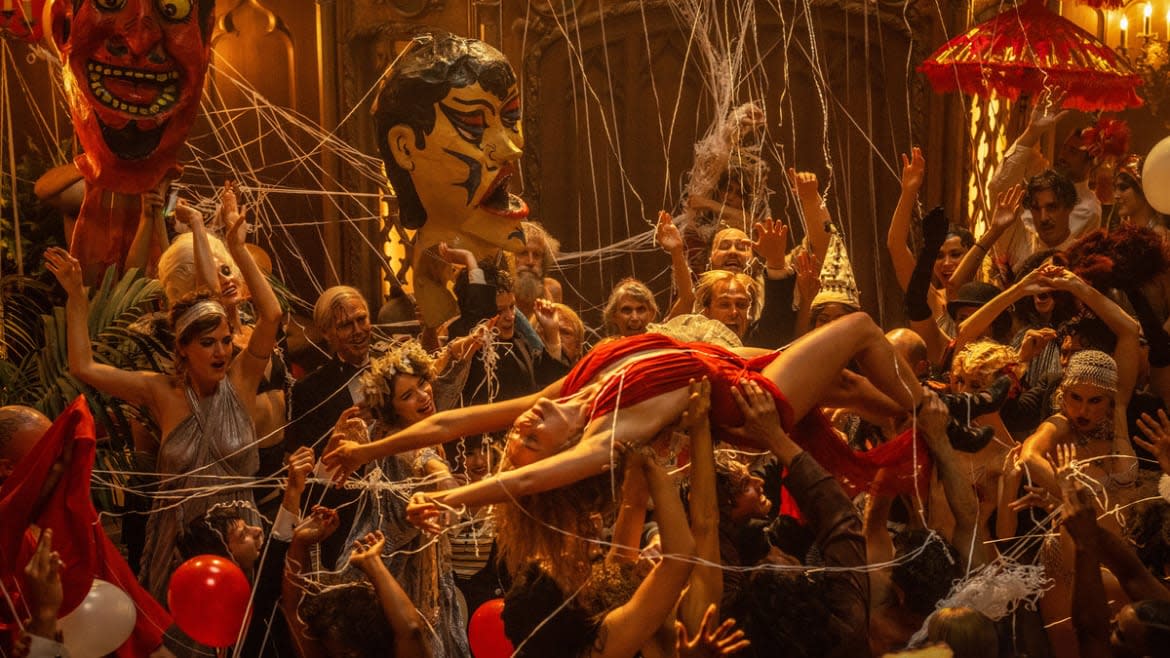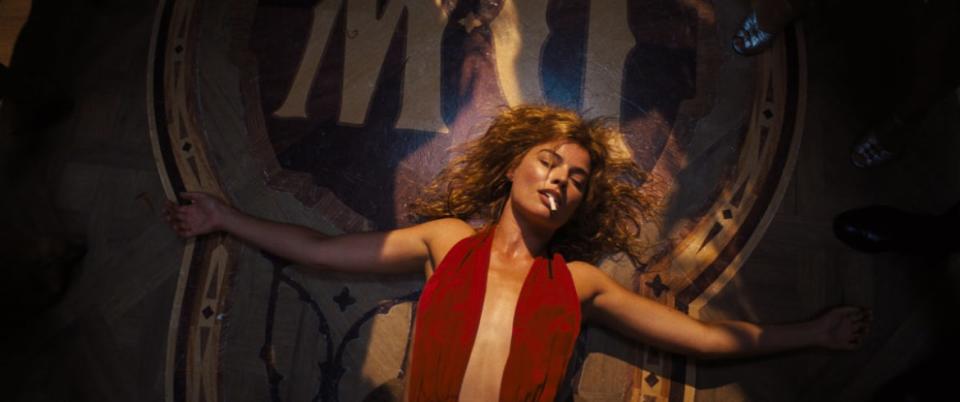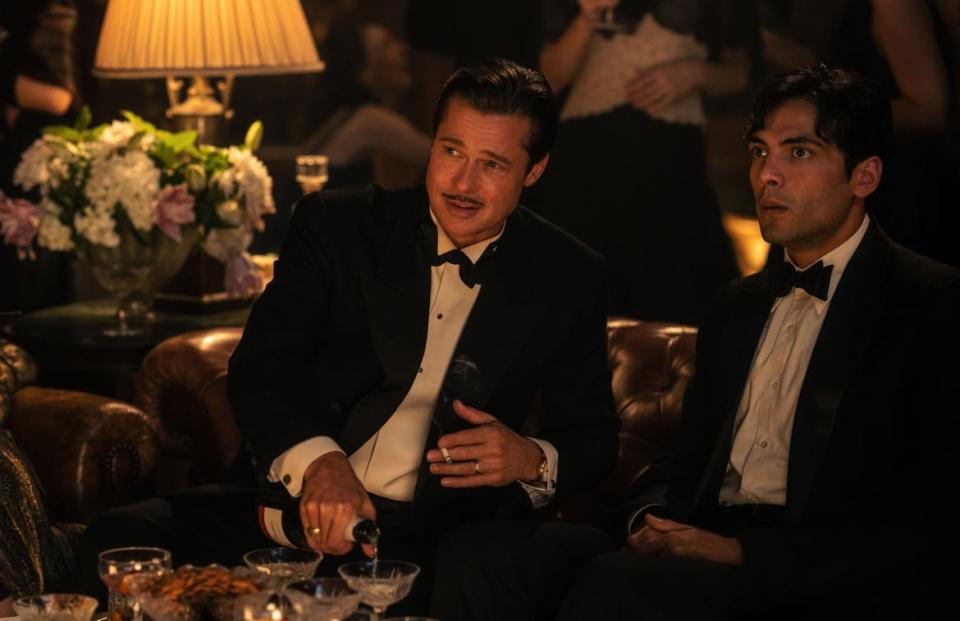‘Babylon’ Is an Orgy of Every Worst Idea in Hollywood

- Oops!Something went wrong.Please try again later.
- Oops!Something went wrong.Please try again later.
- Oops!Something went wrong.Please try again later.
Babylon boasts multiple sights that serve as metaphors for itself: an elephant showering an immigrant man with shit; a woman urinating all over the body and face of a wealthy paramour; a beauty projectile vomiting on a dapper gentleman; a burly psychopath chomping on a live rat; and a pitiful sad sack getting his head stuck in a toilet.
Chockablock with profanity, nudity, and all manner of demented degradation, Damien Chazelle’s follow-up to First Man is a three-hour work of grand and grotesque excess that strives to celebrate the wondrous power of the movies. All it does, however, is crassly steal the magic of its superior ancestors, right up to a finale that parasitically pinches yesteryear’s classics for the pathos it can’t conjure on its own.
Chazelle’s lumpen, maudlin, misbegotten opus (which releases in theaters Dec. 23) has almost too many illustrious forefathers to list, although Quentin Tarantino and Martin Scorsese certainly have valid paternity claims on their hands, as does Paul Thomas Anderson, whose Boogie Nights is pilfered ad nauseam.
The writer/director intends his mimicry to be a form of flattery. Still, his appropriation lends his latest an overarching hollowness that only becomes more pronounced as it proceeds down its familiar path. Moreover, that shortcoming is exacerbated by the fact that, despite primarily taking place in the 1920s, no one looks, acts, or talks like they’re from the swinging decade—a state of affairs that, as with the modern expletives spewed about with gusto, feels at once purposeful and without a real point, except as a way to lazily make the past more accessible to present-day audiences.

Babylon situates itself at that pivotal moment in the medium’s first century when silent movies were forever cast aside by the sound of Al Jolson crooning his way through The Jazz Singer. It’s a crossroads that famously provided the setting for Singin’ in the Rain, and Chazelle knows that all too well, eventually having his film fold in on itself to include that Gene Kelly gem in a climax that’s punctuated by a cinema-history montage fit for an Oscars telecast.
The auteur’s intentions appear quite clear: to make a definitive, award-worthy epic about the majesty of the art form and the treachery of the business that produces it. Yet on both counts, he falls woefully short, crafting only a bustling, showy, grandiose paean to his own behind-the-camera skills that’s lacking anything resembling an original thought or compelling three-dimensional character.
Following a comical prelude involving the aforementioned irritable bowel syndrome-plagued pachyderm, Babylon plunges into a Bacchanalian shindig full of drugs, booze, and enough out-in-the-open screwing to make Caligula jealous. No one at this party is more highly coveted than Jack Conrad (Brad Pitt), MGM’s biggest silent star, who drives his wife (Olivia Wilde) crazy by speaking in Italian, drinks like a fish, and watches the outrageous carousing from the detached perspective of a happy and satiated king.
Spielberg’s ‘The Fabelmans’ Is a Sappy Ode to the Magic of Cinema
Hungrier are Nellie LaRoy (Margot Robbie) and Manny Torres (Diego Calva), she an aspiring starlet who earns a next-day acting gig by commanding the dance floor like the uninhibited embodiment of sex, and he a low-level studio employee who has celluloid dreams dancing in his head. Together, they swiftly hit it big courtesy of their respective carnal and go-getter gifts, as well as forge a bond that’ll last through their stratospheric rise and, later, calamitous fall.
Chazelle orchestrates his action with dizzying cinematographic verve set to blaring, boisterous jazz, generating a frenzied, sultry electricity that matches his coked-up protagonists’ energy. Regrettably, such aesthetic pyrotechnics come at the expense of narrative rhythm or character development; Jack, Nellie and Manny are little more than two-dimensional clichés embellished with brash, licentious affections.
They rarely behave as someone from the jazz age might—especially Nellie, whose shimmying, shaking and shrieking is of a coarse 21st-century variety—nor do they exhibit even the faintest traces of depth. Rather, they’re just sign-marker pawns in Chazelle’s whirligig game, asked to freak out in order to keep the craziness at a fever pitch, and to spout exposition and make statements-of-theme so the audience doesn’t get lost in the pandemonium.

There are two peripheral, token characters of color thrown into this raucous mix—Jovan Adepo’s Black trumpeter and Li Jun Li’s lesbian songstress—which allows Chazelle to interject some bigotry into his condemnation of ugly Hollywood ruthlessness. Those figures, and gestures, are as superficial as everything else in this sprawling mess, which avoids a total collapse only thanks to Robbie, who exudes a force-of-nature vivaciousness that almost sells Nellie as more than a tired type.
Chazelle wants us to care about his players and their falls from grace (due to progress and personal demons). But since they’re cardboard cut-outs who are doomed by their own vices, self-inflicted wounds, and lack of talent—Jack and Nellie are charismatic screen presences without any genuine well-rounded acting ability— their plights are of minor consequence.
‘The Banshees of Inisherin’: Inside the Most Beautiful, Bizarre Movie Shoot Ever
While Calva fares slightly better than his compatriots, he too is merely a stick-figure masquerading as a human being. The same can also be said about Jeff Garland’s studio bigwig and Jean Smart’s gossip columnist, who’s tasked with consoling Jack by telling him that his career is finished but his artistry will live on and “you’ll spend eternity with angels and ghosts.”
Between that mushy declaration and Manny kicking things off by saying that movies are “more important than life,” Babylon works overtime assaulting audiences with its fawning cine-love. Yet ultimately, it just resorts to one Boogie Nights-borrowed twist after another, from an intro tracking shot through revelry, to a mid-story suicide that screams “the party’s over!”, to a late descent into criminal hell courtesy of Tobey Maguire’s psychotic guide. The film is constantly screaming its themes instead of dramatizing them in believable or moving fashion, which turns its madcap mayhem exhausting.
Through it all, Chazelle demonstrates his flair for staging, blocking and framing; his camera’s movement through space—wending its way through crowds, dodging and encircling people, and soaring from one plane to the next—is the lifeblood of this kitchen-sink affair. It’s too bad, then, that he expresses no novel or engaging ideas, as is ultimately epitomized by a clip-package conclusion that vainly tries to freeload its way to eliciting the inspiring emotion the film hasn’t earned.
Get the Daily Beast's biggest scoops and scandals delivered right to your inbox. Sign up now.
Stay informed and gain unlimited access to the Daily Beast's unmatched reporting. Subscribe now.

